The Werewolf of Mariahilf am Inn I.4
A Gothic Horror Novel
Book I, Chapter 4: Suspicions
List of Chapters | Previous Chapter
Four days after Mother Ingrid was buried at the crossroads, the villagers of Mariahilf am Inn were summoned to the haunted toll house to burn it to the ground. The Hofburg in Vienna had issued a formal writ decommissioning it. The aldermen interpreted this as meaning that the building could no longer be considered imperial property.
Father Reuss, the village priest, citing scriptural precedent and quoting the exorcist from Rome, had cautioned the aldermen that destroying it by conflagration could imperil the souls of those who had been murdered there. But the consensus was that, if the building were not purged by fire, a future and graver calamity might befall the village.
To prevent that conflagration from spreading the women and children were given the task of clearing the withered grass and bracken around the building while the men, with the aid of cabled ropes and harnessed bulls, uprooted the trees close by. Torches were kindled and the greased walls were set alight in the late afternoon. The timbers crackled into a raging fire that continued till sundown.
Hermann watched as Aunt Magda hurled her sister’s christening swaddles and confirmation gown into the flames. His father Moritz cast Oma Ingrid’s clothing, cot and bedding into the fire. But he kept her two favorite shawls, telling Hermann in secret that they would need the wool that winter.
On a collapsible table beneath an oak tree, Father Reuss had amassed a pile of sacred things that had belonged to Ilse and Mother Ingrid: crucifixes, rosaries, and missals. These were not to be burned, but sent to Rome for ritual purification and containment by the ecclesiastical authorities there.
With raging fire at their backs Hermann blurted out a question: “Papa, what’s that?”
Magda and Father Reuss turned to the boy.
“What’s what?” Moritz asked.
“There it is again,” Hermann persisted. “It must be that yodeler in the other valley.”
“What are you talking about?” Magda snapped.
“There’s a man trying to howl like a wolf.”
Father Reuss crossed himself.
“Nonsense,” Moritz swiftly interjected. “That sounds just the beams of the toll house catching fire. Come, we’re going home.”
That night Hermann sat on the low stool by the hearth. Moritz folded his arms across his chest and leaned against the wall of the hut.
“We’re going to have to leave Mariahilf,” he said.
“Where will we go?”
“I don’t know. We can’t leave until spring. It’s too late this year. I’m going to Innsbruck tomorrow to talk to some people. I’ll be back in a day or two—”
“No! What if something happens?!” Hermann ran to Moritz and hugged him. “Take me with you!”
Moritz kissed his brow. “Alright, you can come. But it’s going to be a long walk. We’re leaving before dawn. And we’ll be walking along a wooded trail I know to avoid the footpads on the road.”
Not even the milkmaids were awake when Moritz and Hermann crossed the bridge over the river Inn that led out of Mariahilf. Moritz carried a lantern and wore a rucksack with rations in it. He had never been able to afford a rifle or pistol. But both he and Hermann brought their knives.
They passed the toll house’s smoldering remains. When they reached the crossroads, Moritz raised the lantern to inspect his mother’s grave. He turned away, covering eyes with his free arm. He told Hermann not to look but it was too late. An animal had dug up the old woman’s corpse and devoured all but a leg, which stuck out of the earth at a crazy angle. The unbearable stench of putrefaction hung in the air and made both Hermann and his father retch.
Hermann did not understand why they had buried Oma in such a shallow grave, unless the hope had been that the wild beasts and elemental spirits of the haunted valley would reclaim their own and leave the village at peace. Father Reuss had rejected Moritz’s plea for Mother Ingrid to be buried in the consecrated churchyard, insisting in a flustered manner that tradition and canon law dictated she should be interred at the crossroads.
Hermann quickened his pace to keep up with his father’s long strides. He wondered if Papa had noticed that the iron stake that had been driven through Oma Ingrid’s heart had been removed and was now leaning against the signpost of the crossroads, as if someone had intentionally placed it there. He knew this was the same stake because the crown of it had two split flanges that had caught his attention when they buried her.
They arrived at Innsbruck at noon. Hermann had never seen such a town this big in his whole life. It was as if twenty Mariahilfs had been crammed together in a patchwork fashion. Papa indicated that the forested hill to the south had a castle on top of it. And as he said this a varnished black coach drawn by six horses came down the winding road leading up to it. They wandered through the marketplace, whose booths encircled the plague column. The angels and saints carved into the Baroque structure were covered in white pigeon shit.
Moritz removed a wooden bowl from his rucksack and paid a pfennig for a portion of blood pudding. The toothless crone in the booth ladled a spoonful into the bowl; and father and son shared it as they explored the Old Town. Moritz explained that the word “Innsbruck” meant “the brücke (bridge) over the Inn”.
When Hermann finally laid eyes on the eponymous bridge, he sniffed and said, “It’s littler than ours.”
They made their way to a pub at the heart of Innsbruck that Moritz had frequented in his younger days. It was two-stories tall and called Zum Goldenen Dachl (The Golden Roof), taking its name from the fire-gilded copper tiles that covered the pillared second-story balustrade of the Tyrolean monarchs’ residence, which stood opposite the square.
They stepped into a hazy taproom that smelled of smoked pork and Turkish tobacco. Moritz made his way to the bar and ordered a krug of beer for himself and a nösel (cup) for Hermann. Moritz asked the barkeep about a few of his old acquaintances, whose names he could only vaguely recall. But the barkeep had only lived in Innsbruck for two years.
A thickset young man at the bar overheard Moritz and said that he might be the son of the barrel-chested man whom Moritz had been alluding to. Then he pointed to a sag in the upper gallery where a fat man was sitting with his friends.
The three of them went to the stairs in the adjacent dining room to the second floor. (Hermann was grateful that his porcelain mug had a tin cover.) The boy was so exhausted after keeping pace with his father all morning that, no sooner had they sat down at the stammtisch than he fell asleep without so much as taking a sip of beer.
When he awoke, Papa was laughing and speaking animatedly with a man who went by the nickname das Pulverfaß (Powder-keg), so called for his girth and fiery temperament. But beneath the gruff exterior old Powder-keg was a kind-hearted man. His real name was Friedrich and he earned a comfortable living carving the wooden heads for puppets and making masks for religious and secular plays throughout Austria and Bavaria. His son, the youth they had encountered in the taproom, was named Ludwig.
“At the spring thaw,” Friedrich said, “Ludwig will be departing here for the Rhineland.”
“So far?” Moritz asked.
“Yes. The guilds in the north are all but dead. So there’s money to be made for hard-working artisans. My brother Berthold is a wheelwright in a town called Cronenberg, located on the Wupperthal (Wupper Valley). He’s now as rich as Croesus; Ludwig is going there to work for him.”
“Then you’re not going as well?” Moritz asked.
“No. My wife will never leave Innsbruck. Besides, she has a mortal fear of Lutherans.”
“Then your brother is Lutheran?”
“Good God, no! He’s more Catholic than the Pope.”
It became clear to Hermann, who had slept for nearly an hour, that his father had broached with this man their situation and plans to leave Mariahilf.
“You know,” Friedrich remarked, “you and your son could accompany Ludwig when he leaves the Tyrol. He’ll be departing two weeks after Easter. I would better if he had a travel companion.—Or should I say two?” He winked at Hermann. “I’m sure Berthold would take both you and your son on in his factory. He complains in his letters that he hasn’t enough skilled laborers. The Krupp works in Essen and the collieries in the Ruhr are snatching them up . . . I shall draft a letter on your behalf, vouching for you and your son. Ludwig will present it to Berthold upon your arrival. And so it’s done!”
Moritz picked up Hermann’s beer and drained it. “It sounds too good to be true. I’m afraid you’re drunk.”
“My wife would flay me alive if I came home drunk.”
“It’s the truth!” Ludwig said and whistled through his teeth. “And if I may chime in, I’ve never been out of Austria—except for a brief trip to Oberammergau for the Passion Play. I’d feel much better traveling with fellow Tyroleans.”
“Come, Moritz!” Friedrich rose from the table. “You and your son will sleep in my attic. And we’ll discuss the matter tomorrow—and if need be the day after—before you both head back to the valley.”
Two days later, shortly before sundown, Hermann and Moritz returned to Mariahilf. The sky was leaden; and a misty rain fell through the trees just as they exited the wooded trail and saw the signpost of the crossroads. The stake was gone, probably stolen by thieves for the iron. When they entered the clearing, Hermann was struck by the grotesqueness of the toll house’s bones, now a black ruin.
They crossed the bridge. The road snaking through the village was miry. Someone had evidently alerted others to their arrival, because Father Reuss stood on the steps of the Mariahilf Church, directly across from Moritz’s home. The priest seemed upset when he saw the two of them approaching.
“Father,” Moritz mumbled, by way of greeting. The priest nodded. A handful of villagers had gathered near the well by the blacksmith’s forge, Magda and the fiery-spirited Guido were among them. Hermann knew something was amiss, but he couldn’t lay his finger on what it was.
Moritz opened the wicket gate in the fence that ran along the front of his property. He raised his lantern and stopped dead in his tracks. Dozens of crucifixes covered both the door and the wall fronting the church.
Moritz wheeled around and shouted to Father Reuss. “My family has lived in this valley for five generations!” He shot Magda an angry look. “I’ve known most of you since I was Hermann’s age!”
“It’s not you that’s the problem,” Guido sneered.
Father Reuss stepped into the road. “Take it back, Guido! Apologize now!”
Moritz put his arm around Hermann’s shoulder to demonstrate his unwavering support and love for his son.
“I’m sorry,” Guido said in a silky voice.
“Go inside,” Moritz told Hermann.
The boy lowered his head and went to the door. He overheard Father Reuss say in a low voice, “It’s not the boy’s fault.”
That night Moritz sat in his high-backed chair and stared at the dying embers in the hearth.
“If you want, Papa,” Hermann said. “I’ll leave Mariahilf. I’m grown up now, and can take care of myself.”
A tear rolled down his father’s cheek. “No. . . You and I are staying together. We only have each other now.” His eyes were drawn to the floorboards. “There’s something I need to tell you. Something I must tell you before we leave. But not tonight.”
At a meeting in front of the Mariahilf Church on the final Monday of November, Rudolf the milk-herd (the oldest man in the village) predicted economic prosperity for Mariahilf when the Brenner Pass was again negotiable in the early summer of the coming year. When Old Rudi spoke, people listened.
“I predict that travelers coming from the east,” he said, gesturing toward Innsbruck, “will be willing to prolong their journey a few days in order to bypass the imperial toll road south of Innsbruck. The Crown is dealing with an insurgency in Hungary; and the toll collectors are extorting outrageous fees. Since Mariahilf no longer has an imperial toll house, word will get out and Mariahilf will be seen as a more attractive route to the Brenner Pass.”
“Rudi’s Declaration” (as everyone called it) raised most of the villagers’ spirits. But Moritz remained grim during the meeting.
Hermann had never seen his father so depressed as he became in those last days of 1848. The boy felt embarrassed for his father on that Sunday when Moritz asked Father Reuss if the struts in the church needed refurbishment. The old priest shook his head: “No, not this year. I’m afraid that won’t be necessary.”
Two days later, Viktor, Mariahilf’s blacksmith, informed Moritz that he had signed an agreement with another carpenter in the Tyrol to make the shafts and handles for the tools and farming implements he was forging.
“Where have you found another carpenter?” Moritz fumed.
Viktor, whom Moritz had worked with for over twenty three years, uttered a cryptic reply: “I’ve been thinking a lot lately about the night your son was born.”
Hermann was at his father’s side when the blacksmith said this. Moritz’s eyelids fluttered, but he did not respond.
No one needed a fence mended. No one needed Moritz so much as to chop firewood for them. But Moritz chopped firewood nonetheless, because winter was fast approaching and it had already begun to snow.
Hermann and Moritz would have starved during the bleak months of winter had not the parish provided them with food: potatoes, onions, turnips. There was no meat, other than the trout and perch that father and son fished from the iced-over Inn. But a half dozen eggs came each week from Aunt Magda, who had been commanded by Father Reuss to do this. The two of them grew lean. Moritz, who had always been fastidious about shaving, let his beard grow out.
The doors and shutters of the hut opened inward, since otherwise the build up of snow and ice might have prevented them from getting out. Hermann sealed the shutters and chinked the walls with straw and mud. The firewood was brought inside and stacked against the walls to keep it dry. As a further precaution, Moritz brought inside from the workshop two spades, a pry bar, a hammer and a handful of iron nails.
Hermann had outgrown his bed; and, despite the time and craftsmanship that had gone into its construction, Moritz dismantled it to use the wood for kindling. But the painted headboard, adorned with an image of the Virgin Mother, was preserved and mounted over the bed behind the curtain that he and Hermann now slept together in.
Moritz had two coal-pans that he filled with hot coals at night and screwed the lids shut to place them under the eiderdown mattress before they went to sleep.
Sometimes, the sudden coolness caused by his father’s leaving the bed, caused Hermann to wake up. And during these times he often heard Papa pacing the floor and weeping on the other side of the curtain.
On New Year’s Day, a blizzard swept through the valley. High snow drifts mounted around all the structures, all but trapping the villagers in their respective dwellings. Three nights later, once the storm had abated, Hermann had a nightmare unlike any he had ever experienced before.
He dreamed he was a wolf cub suckling the teats of the same she-wolf he had killed in the mountain. He knew he was not actually a cub, but a deformed extension of the teat that his mouth was attached to. He tried to pull away from it, so as not to choke on the black gall coursing down his throat. But he couldn’t. And he couldn’t breathe.
He stared at the cub beside him, and saw that the cub had his father’s head. Moritz’s eyes were wide with terror because his lips, too, were fused to the she-wolf’s teat. With a desperate upward glance, Hermann saw his mother Ilse smiling down on them. But sometimes her face was the bearded face of the cannibal who had been hanged in the valley. Suddenly, her mouth transformed into a fanged muzzle. And Oma Ingrid could be heard laughing and screaming somewhere in the valley.
Hermann gasped for a breath of air and woke up, covered in sweat. He glanced over and saw that Papa was not in the bed. On the other side of the curtain, the iron poker prodded a fire that Moritz had stoked back to life from the low embers. The boy threw off the covers and climbed down from the bed. When he pulled the curtain aside, he saw Moritz sitting on Oma Ingrid’s stool next to the hearth.
“I’ve had a terrible dream,” he said. “I dreamt that I was. . . ”
“A wolf cub?”
Moritz let the poker fall and seized his head with both hands. “All my life, my mind has rebelled against the notion that God in his benevolence and greatness would permit Hell’s denizens to walk among us. On the night you encountered the werewolf in the mountain, I told you that such things do not exist. But now I have seen too much, heard too much. I can no longer deny the testimony of my senses . . . Hermann, I too heard a voice howling on the day the toll house was burned.”
He leapt from the stool and began to pull up the floorboards from the grooves he had built to hold them. He turned the boards over and exhibited to Hermann the bloody stains on the other side of them, some of which looked like paw prints.
“I must tell you what happened the night your mother disappeared.”
“Oma told me already,” Hermann said. “She said the day Mama vanished, there was blood on the bed sheets and paw prints on the floorboards.”
“I knew she had mentioned something about that night on the day I surprised the two of you whispering to each other. She told me exactly what she said to you. But your sweet Oma did not tell you the whole story.”
Moritz grabbed one of the spades leaning against the wall behind the sacks of wheat and rotting vegetables. He took it to the middle of the room and pulled up five more floorboards, stepping down onto the hut’s dirt foundation now frozen solid. He plunged the iron shovel into a low mound, and looked up at Hermann.
“It was not just blood on the sheets. There was flesh—inhuman flesh. It was as if someone had dismembered a wolf and cast its parts pell-mell on the mattress.”
Moritz dug as he spoke: “I asked Mama what to do. She warned me that no one would believe what had happened. The blood on the sheets, combined with your mother’s disappearance, would condemn us both to the gallows as murderers.
“Mother warned me that even removing the sheets to dispose of them was fraught with danger.—What if a neighbor surprised us in the act?
“‘Our only choice,’ Mama said, ‘is for you to bury the wolf flesh and the bedclothes beneath the hut, so that none knows what has transpired.’
“I buried them as your grandmother bade me do.”
A tawny piece of cloth was sticking out of the cold hard dirt.
“My son, if we leave Mariahilf in the spring, we must dispose of the things I have buried and burn the blood-stained floorboards. Otherwise, someone may discover them and I will be accounted a murderer and fugitive. And you will lose your father forever.”
Hermann plucked a hot coal from the hearth with tongs and lit a tallow candle by it. He stepped down into the hole with Moritz and crouched by the bundle of stiffened cloth that the digging had revealed, and his father crouched beside him.
Moritz lifted a flap of the cloth, and the two of them fell back in horror.
“Christ!” Moritz exclaimed.
The skull of a raven-haired woman whose papery gray skin still clung to the bones gazed up at them. An oozy black liquid in the eye-sockets reflected the candlelight.
“I didn’t kill her,” Moritz said, looking aghast at his son.
“I know, Papa.”
Moritz stood up, and with the iron head of the spade, he pulled back the rest of the torn coverlet, disclosing something that neither father nor son could at first comprehend.
The arms of the corpse were crossed over its chest, but one of these arms had the skeletal articulations of a canine leg. Beneath a breast of grizzled gray fur sagged the six flabby teats of a she-wolf. And under these were the tattered remains of a penis and scrotal sack.
Moritz gaped at the abomination in shock.
But Hermann had an idea and spoke. “Papa, I know what we can do.”
“What?” Moritz asked automatically, not really hearing what the boy said.
“While it is still dark, I will grab some heavy rocks along the banks of the Inn. We’ll remove the vegetables from the burlap sacks. We’ll break apart the skeleton, put the bones in those sacks, weigh them down with the rocks and drop them into the cesspit of the latrine. Our latrine has been in the same place since I was seven. That means that in the spring, when we fill it in and dig a new one before we leave Mariahilf, no one will suspect anything. And the werewolf will have been buried.”
Moritz fainted and collapsed.
Hermann went to his father and massaged his shoulders until Moritz opened his eyes.
“Papa, this thing under the hut is why we’re having nightmares! It’s the reason I saw the wolf on the mountain. Don’t you see? Once the bones have been thrown into the cesspit where they belong, all will be well.”
Hermann ran behind the curtain to the chest-of-drawers by the bed
“What are you doing?” Moritz asked, regaining his senses.
“I told you! I’m going to go outside and get heavy rocks!”
He put his coat on and wrapped one of Oma’s shawls around his neck. He opened the front door and stepped outside. Clenching and unclenching his hands, he made his way to the place behind the house that led down to the river. The mountains were pale and gray beneath the stars. He could tell by the position of the moon that it was only an hour after midnight.
When he reached the icy riverbank, he found a flat granite slab that was quite heavy. He remembered that the workshop steps were made of loosely mortared cobbles, and that these stones, though not as heavy, could be used as well. So he would only need to make one trip to the river.
He lifted the rock as his eyes glanced at the bridge. A shadowy figure stood in the middle of the bridge. He dropped the rock, and strained his eyes. There was nothing there. It had been his imagination. He picked the rock up again and was making his way (with difficulty) up the slick embankment when he heard the sound of paws clicking on the bridge’s icy planks.
He concentrated on where he was walking, and refused to look up. When he had made it to the hut, he was grateful that father had not removed the crucifixes from the door, because they seemed to have kept whatever it was that was lingering in the dark at bay. He did not tell Papa what he had seen or heard, because he wasn’t really sure now whether he had seen or heard anything at all.
Under the cover of night, the two of them went back outside together to pry the cobbles from the workshop steps. The bones were stuffed in the burlap sacks and carried outside. Moritz pulled the hinged seat off the caisson it was fastened to. They dumped the sacks one by one into the pit and heard the thin ice that had formed on the sewage water crack and give way as the weighted bags sank to the bottom.
They were back in the hut before dawn. Once inside, they boiled water and washed themselves next to the gap in the wooden floor that Moritz had made. They poured the used water into the dirt and it filled the hole where the werewolf’s skeleton had been. Exhausted, they put on their nightshirts and went to bed, sleeping dreamlessly and uninterruptedly for all the following day.
When they awoke the next morning, Hermann had to answer a call of nature. He put on his coat and went outside. But he returned moments later, having soiled his nightshirt.
“What’s wrong?” Moritz asked.
Hermann did not answer but lowered his head in shame. Moritz strapped on his boots and stepped outside in his nightshirt.
There were paw prints in the snow leading from the front of the hut to the door of the latrine. Moritz stepped back inside.
“We’ll use bedpans from now on,” he said. “Until we leave Mariahilf.”
Hermann covered his eyes with his hands and cried.
On the day after Easter, Moritz and Hermann stood in the village square before the Mariahilf Church. The community gathered to see them off. The tumbril and dray horses that had borne the werewolf to the place of execution had been given to Moritz on Palm Sunday as his parting gift.
“Unusual gift,” Moritz commented.
Father and son loaded as much of their belongings as they could fit into the wagon. But the big bed, their crockery, and all of Moritz’s large tools, including the lathe with its India-rubber belt, would have to be left behind. Moritz kept the painting of the Virgin Mother that he had made, because he thought that he might be able to sell it and make money, should their circumstances become desperate.
Moritz stashed his razor, shaving mirror and the memento mori he had carved into the rucksack. The poor carpenter had anticipated that the aldermen would vote to compensate him for his real estate and for the contents of his hut and workshop. But to his utter bewilderment, the topic was never raised.
The women loaded the cart with enough food to last them for a week.
“Is that it?” Moritz asked in a tense voice, looking incredulously at Father Reuss.
“We didn’t force you to leave,” Old Rudi remarked. “I told you that once the snows thaw—”
“But you did force us to leave!” Moritz shouted. “Viktor is going to claim my workshop as his own!” He pointed to the blacksmith, who was contemplating his boots with pursed lips.
The corners of Father Reuss’s lips were turned down as he walked to the cart. Hermann had never heard the priest speak as coolly as he did to them at that moment. “If you leave now, you and your son should make it to Innsbruck by nightfall.” He handed Moritz and Hermann each a small paper with an image of Saint Christopher on it.
Hermann spoke in the voice of a defeated man. “Bless you, Father. And may Mariahilf am Inn prosper and flourish by the grace of God Almighty. Amen.”
“Amen,” the priest replied.
“Come on, boy,” Moritz said. Hermann climbed up into the tumbril and sat on the blanket covering their belongings, facing the rear of the wagon. Moritz took up the horses’ reins and led them from the square. The villagers walked behind them until they had made it to the bridge, where the priest made the sign of the cross and bade them farewell. Moritz refused to look back or acknowledge the blessing.
Hermann noticed how his Aunt Magda had moved apart from her father and the other villagers. She scowled at him and did something in the misty morning that no one else saw. She covered her breasts with her palms and spat on the ground to signify that she regretted the day she had ever agreed to be Hermann’s wet-nurse.
They passed the foundation stones of the obliterated toll house and followed the path that led into the woods and to crossroads. They would never see Mariahilf am Inn again.


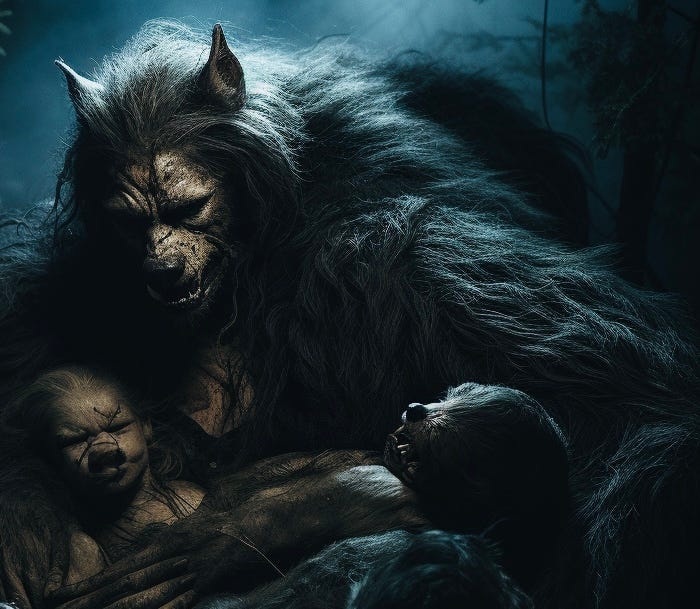



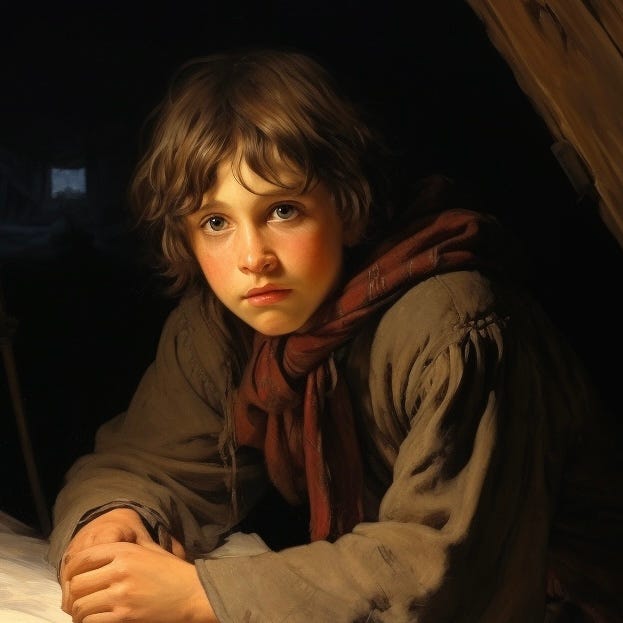
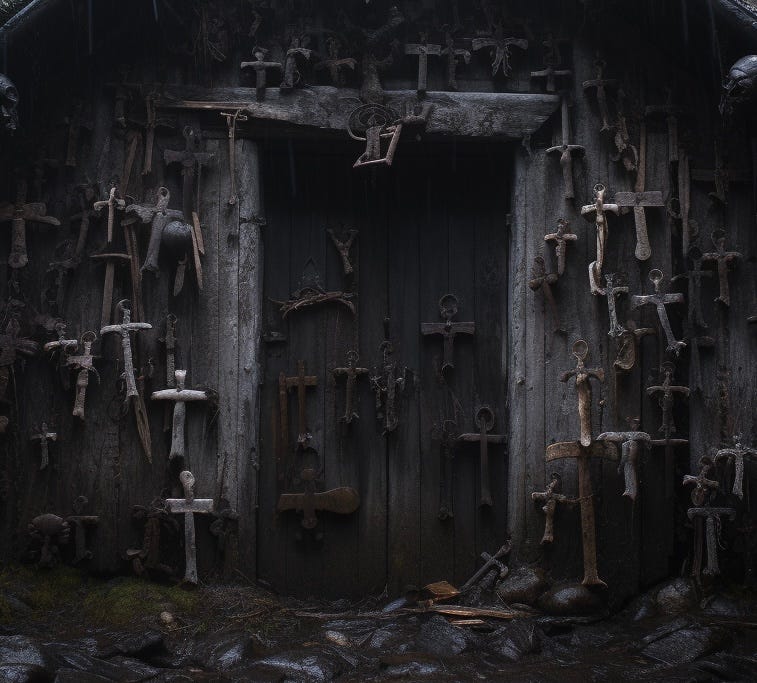

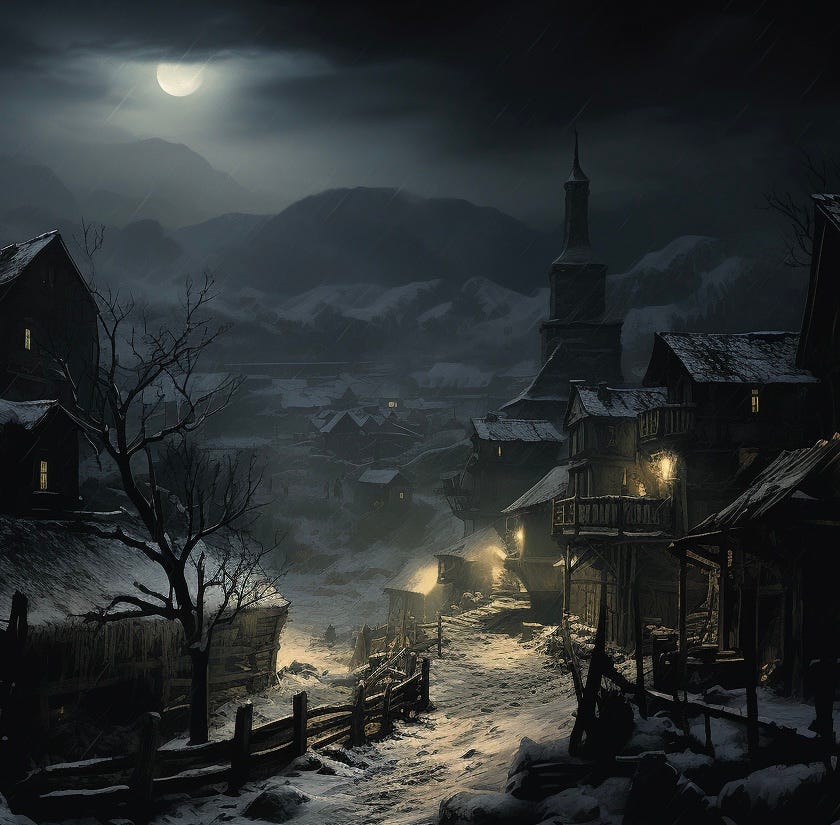
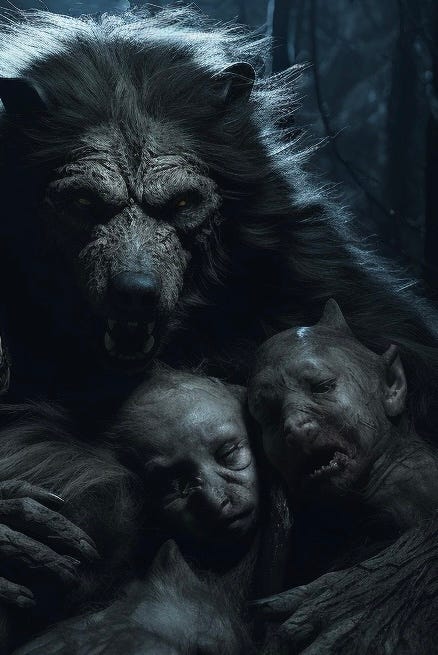


This has to be one of my favorites among your many great stories. Your expansion of the region’s existing werewolf lore (which is fascinating in its own right) combined with your almost supernatural ability to authentically convey the character and particularity of a time and place really bring this story to life. I feel like I’m reading a real historical account which, for me, makes this story wonderfully unsettling :-)
Really enjoying this story, Daniel
As the nights are drawing in, with Autumn just around the corner, these are the kind of dark fireside tales that I like to be reading
The dank, fog shrouded setting, populated by zealots and superstitious villagers really sets the tone for an interestingly brutal and bloody take on the werewolf mythology
Looking forward to the next instalment 🐺